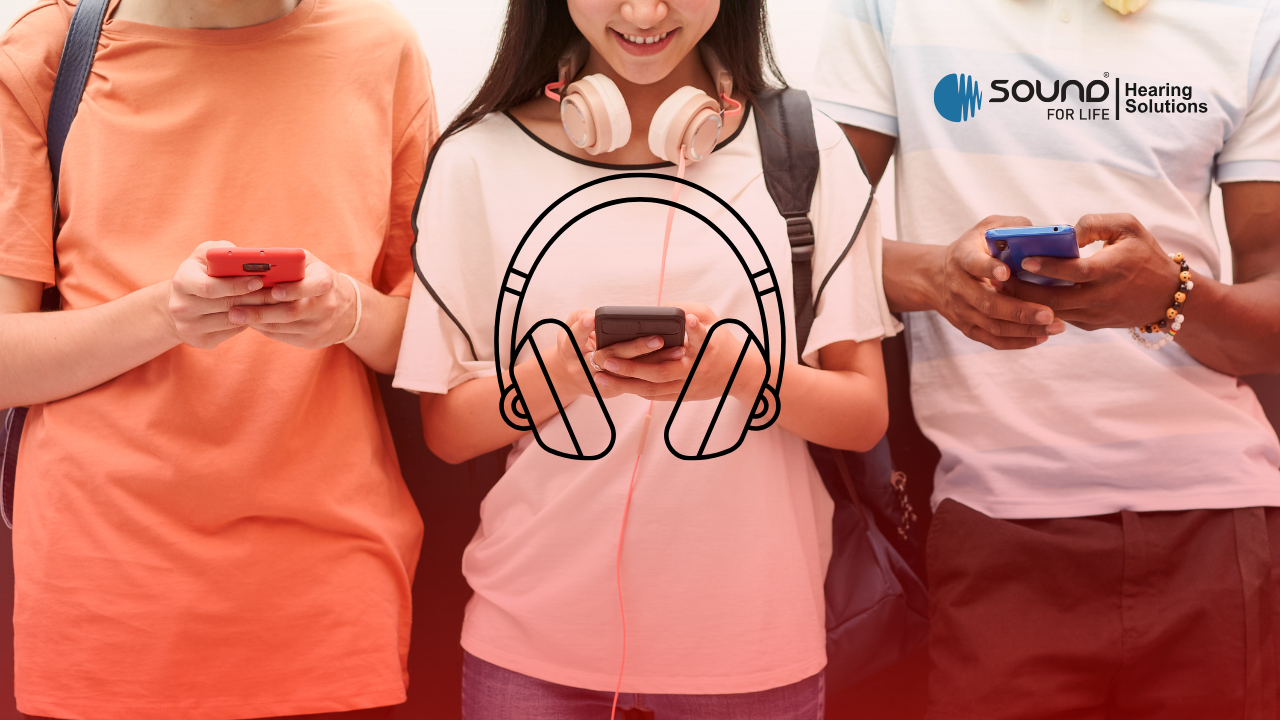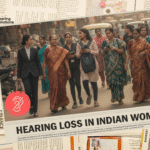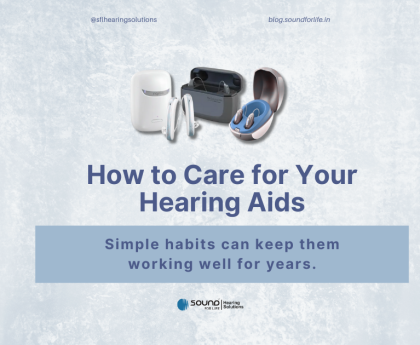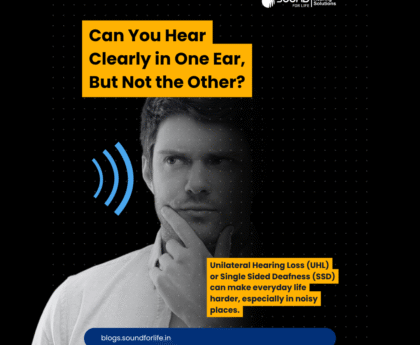Our mobile phones have become our constant companions, in today’s fast changing digital age. We spend hours every day on our gadgets, using them for work calls, streaming music, social networking, and leisure. But with this growing dependence, one important question arises:
Can talking on the phone make you lose your hearing?
A lot of people are concerned about this subject, and for good reason. People often forget about their hearing health, although it plays a critical role in how we communicate and connect with the world around us.
In this blog, let us try to find the truth about how using mobile phones really does any harm to your hearing, what the current research suggests, and what you can do to keep your ears safe from damage.
Understanding How We Hear
Before we talk about the risks, let’s quickly go over how our ears work.
There are three primary sections of the ear:
- Outer Ear: Collects sound waves and funnels them inward.
- Middle Ear: Has tiny bones called ossicles that make the sound louder.
- The cochlea, or inner ear: Converts sound waves into electrical signals that are sent to the brain.
Hearing loss can happen, if any part of the system mentioned is damaged, especially the delicate hair cells of the inner ear. These cells can’t grow back once they’ve been damaged, thus hearing loss is irreversible in a lot of situations.
The Rise of Mobile Phone Usage in India
The Telecom Regulatory Authority of India (TRAI) says that India has more than 1 billion mobile subscribers and that a lot of people spend 4 to 6 hours a day on their phones. We are always exposed to sound, whether it’s through voice calls, films, or music through headphones.
Mobile phones may give off electromagnetic radiation, however the biggest danger to hearing is frequently being around loud sounds for a long time, especially through earphones, earbuds, or headphones.
How Mobile Phones Could Affect Your Hearing
Let’s look at some of the ways that using a cell phone might affect your hearing health:
1. High Volume and Long Listening
This is the most prevalent cause why people have hearing difficulties when they use their phones.
When you listen to music or talk on the phone with earphones or headphones at a high volume, the sound can reach levels beyond 85 decibels (dB), which is the level at which hearing impairment can start if you listen for more than 8 hours a day.
- If you listen to music at 100 dB (a normal loud music level), you might lose your hearing in less than 15 minutes.
- A lot of cellphones can go up to 110–120 dB, which is very loud.
Noise-induced hearing loss (NIHL) is a permanent kind of hearing impairment that makes it hard to hear high-frequency noises. It happens when you are around loud sounds all the time.
2. Radiation from cell phones
Some individuals are worried that the non-ionizing electromagnetic radiation that mobile phones give out can hurt the inner ear.
But there is no clear scientific proof. Research has not established that typical mobile phone radiation induces hearing loss.
Still, keeping phones close to the ear for a long time may cause momentary pain, like:
- A feeling of warmth or fullness in the ear
- After extended calls, mild tinnitus (a ringing sound)
To reduce exposure, experts suggest utilising hands-free devices or speaker mode.
3. Using One Ear for All Calls
A lot of people always use one ear for all of their phone calls. Over time, this might cause an imbalance in auditory stimulus, which could lead to:
- Fatigue in the dominant ear
- One ear is weaker than the other, which is a sign of slight hearing asymmetry.
To stop this from happening, attempt to switch ears during calls when you can.
4. Earbuds can cause ear infections.
Using earbuds or in-ear headphones all the time might obstruct airflow in the ear canal, which can trap moisture and germs. This might cause:
- Ear infections (otitis externa)
- Buildup of wax
- Hearing loss for a short time
You may avoid these problems by cleaning your earphones often and letting your ears “breathe.”
What Does the Evidence Say About Scientific Research?
Many research throughout the years have looked at how using a mobile phone might lead to hearing loss. They found this:
Study 1: The Connection Between Mobile Phone Use and High-Frequency Hearing Loss
The Indian Journal of Otology released research that indicated that those who used their phones for more than two hours a day for more than three years exhibited early indicators of high-frequency hearing loss compared to others who didn’t use their phones.
Researchers said this was because of:
- Exposure to loud sounds
- Long phone conversations close to the ear
Study 2: Effects of Radiation
According to a study published in Environmental Health Perspectives, radiofrequency (RF) radiation may raise ear temperature somewhat, but it does not directly harm auditory cells.
Study 3: Using Earphones and Hearing Health
A study of Indian college students in 2020 found that:
- 70% of them used earbuds every day.
- 35% said their ears were ringing or filled.
- 15% reported small changes in their hearing threshold.
This shows that lifestyle choices, not only phone radiation, have a big effect on hearing health.
Common Signs of Hearing Loss from Using a Cell Phone
You might not realise that you’re losing your hearing right away since it happens slowly.
Be aware of the early warning signs:
- Having to turn up the volume on your phone a lot
- Hard to comprehend speech, especially when there is a lot of noise
- Ringing or buzzing in the ears (tinnitus)
- Ears that feel “blocked” or “full”
- Not hearing high-pitched noises like birds singing or doorbells
If you observe any of these, you should make an appointment with a trained audiologist for a hearing test.
Hearing Protection: How to Listen Safely
The good news? You don’t have to stop using your phone or listening to music to keep your hearing safe.
You can use technology securely if you learn how to listen smartly.
1. Follow the 60/60 Rule
- Don’t turn the volume up higher than 60%.
- After every 60 minutes of listening, take a break.
This gives your ears time to recover after being exposed to the loud noise for long periods.
2. Pick Over-Ear Headphones
Over-ear or noise-cancelling headphones are safer than in-ear earbuds since:
- They provide better sound isolation (you don’t need to turn up the volume).
- They reduce direct pressure on the eardrum.
3. Don’t make calls in loud places.
When there’s noise in the background, we prefer to turn up the volume on calls, which makes our hearing work harder.
Instead, go to a calmer place or put on noise-cancelling headphones.
4. Switch Ears While on the Phone
Switching ears can help you avoid becoming tired and make sure your hearing isn’t inconsistent.
5. Use a wired headset or speakerphone
Not putting your phone up to your ear not only protects you from radiation, but it also keeps heat from building up.
6. Keep your ears clean and dry.
Cleaning your ears regularly can help keep wax from building up and infections from becoming worse, which can make hearing difficulties worse.
7. Have your hearing checked often
If you use your phone or headphones a lot, you should get your hearing checked once a year.
Early detection makes it possible to take action right away, including hearing protection or treatment if needed.
Smart features that help with technology and safe listening
Smartphones these days come with built-in features to safeguard your hearing.
How to utilise them:
- Volume Limiters: Most Android and iPhone smartphones let users select a safe level of sound.
- Hearing Health Apps: Keep track of how much you listen to and let you know if the sound level is too high.
- Automatic Volume Adjustment: Some headphones come with an in-build auto-reduce volume technology that automatically lowers the volume when there is a lot of noise around them.
Take advantage of these smart features to protect your ears effortlessly.
Is it possible to reverse hearing loss from Mobile Use Be Reversed?
Hearing may come back after rest or therapy if the impairment was caused by temporary loud exposure or an ear infection.
But hearing loss that lasts a long time because of loud noise can’t be fixed; it can only be controlled with equipment like hearing aids.
That’s why it’s always preferable to stop something from happening than to fix it.
Hair cells in the inner ear don’t grow back when they become injured.
When to seek an audiologist help
If you notice ringing, discomfort, or muted noises after using the phone for a long time, see a hearing professional.
- Trouble hearing conversations clearly
- If you notice that one ear hears better than the other
An audiologist can do:
- Hearing threshold testing
- Otoacoustic emission testing (OAE)
- Tests of the middle ear
At SFL Hearing Solutions, our experts utilise cutting-edge diagnostic techniques to precisely check your hearing and offer personalised solutions, such as digital hearing aids that match your lifestyle.
The Bottom Line: Balance Is Important
Although using a mobile phone does not cause hearing loss, how you use it does matter. Over time, listening to loud music, making long conversations in one ear, or using inexpensive earbuds might harm your hearing. You can use your phone safely and yet get all the benefits without putting your hearing at risk.
Important Points
- Loud volumes and long listening sessions are the biggest risks to hearing.
- Radiation exposure from phones is minimal and there is no proof that they cause hearing loss.
- Alternating ears, taking breaks and maintaining the volume below 60%, are all good ways to safeguard your hearing.
- Symptoms like ringing or muffled sounds should never be ignored.
- Regular checkups of your hearing are important for finding problems early.
Take the Next Step to Better Hearing Health
Our goal at SFL Hearing Solutions is to help you safeguard your hearing so you may confidently and clearly enjoy everyday sounds without struggling to hear clearly.
Don’t disregard any pain, ringing, or hearing issues you may be experiencing. Schedule a thorough hearing examination with one of our hearing experts right now.
To make an appointment, contact us by phone or stop by the SFL Hearing Solutions,
location that is closest to you.
It’s important to take care of your hearing before it’s too late!
You may make an appointment by calling us or going to the closest SFL Hearing Solutions location.
Take care of your hearing before it’s too late!
Disclaimer
You shouldn’t use this material instead of expert medical advice; it’s just for educational reasons. If you think you might have hearing issues or pain in your ears, please see a certified ENT expert or audiologist for a correct diagnosis and treatment.





